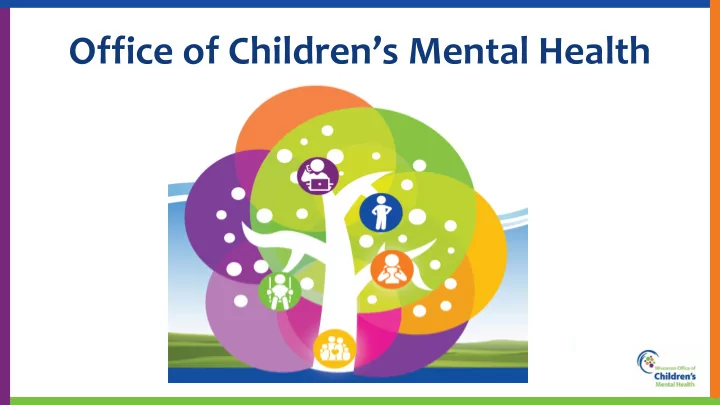

Office of Children’s Mental Health
OCMH – About Us Our Vision Our Values • Wisconsin’s children are Collaborative across safe, nurtured and systems supported to achieve • Data driven their optimal mental • Family and youth health and well-being. guided Systems are family- • Promote inclusivity and friendly, easy to navigate, equity among all equitable, and inclusive of all people. stakeholders
Coordinate & Integrate Services Collective Impact • Children’s Mental Health Collective Impact Council state department representatives, advocates, mental health and medical professionals, educators, and people with lived experience Collective Impact is a structured approach that brings people together to achieve social change. It brings people from different sectors to focus on a common agenda and goals for solving a specific social problem instead of organizations working alone, in isolation.
Coordinate & Integrate Services Collective Impact Initiatives • Scaling Wellness In Milwaukee (SWIM) • Milwaukee Coalition for Children’s Mental Health • Trauma & Recovery Project • Milwaukee Mental Health Task Force
Coordinate & Integrate Services Statewide Coalitions • NAMI Wisconsin • Wisconsin Alliance for Infant Mental Health • Coalition to Expand School-based Mental Health in Wisconsin • Children’s Health Alliance
Coordinate & Integrate Services Councils • Wisconsin Mental Health Council • Children Come First Advisory Committee • Early Childhood Advisory Council • Leadership Council on the Early Years
Coordinate & Integrate Services Collective Impact Teams • Access • Infant Toddler • Resiliency • Trauma-Informed Care
Disparities in Access to Services • Annual Report – 2019 – Page 1 Address the root causes of why Wisconsin children are struggling and understand if a child goes to school hungry or if a child doesn’t feel like they belong in their school or community, their mental health is likely to suffer Reorganized our child well-being indicators into the 5 categories of social determinants of health (the conditions where people live, learn, work, and play)
Disparities in Mental Health Care Minorities are more likely to delay or stop treatment as a result of geographic or insurance barriers and less likely to receive culturally appropriate treatment. What works to reduce disparities and improve mental health outcomes? Increasing the cultural and linguistic competence of the mental health workforce. Integrating behavioral health care with pediatricians. Adhering to treatment by decreasing stigma and fear of medication. Involving people who have lived experience with children’s mental health in the program and policy decision-making process. OCMH Prioritizing Children’s Mental Health Fact Sheet, May 2020
Disparities in Access to Services Trauma-Informed Care Workshops - 2019 Vicarious Trauma/Secondary Trauma/Self-Care Enhancing Family Engagement by Understanding Cultural and Historical Trauma Operationalizing Trauma-Informed Care in Your Organization Working with Children and Families in the Home: Safety as a Foundation of Trauma-Informed Care
Lived Experience Leadership Lived Experience Leaders’ reach in 2019
Lived Experience Leadership • Lived Experience Partners • Advocate to state agencies • Consult on lived experience OCMH Website • Trainings and Conference • Our website • Listening Sessions
Listening to Youth
How can you help? • Identify critical themes & system improvements • Advocate and lobby for policy and legislative changes • Identify more people with lived experience • Tap into your own lived experience and tell your story
How can you help? Suggested Action Ideas • Telehealth policy post – COVID • Resources available and needed • Mental Health Workforce Shortage
Building Emotional Well-Being Through Strong Foundations
Updated OCMH Website
OCMH Online Thursday, May 7, 2020 | Social Media Campaign #YouAreNotAlone | #PeerSupport | #ChildrensMentalHealthMatters
OCMH Fact Sheets • Healthy Use of Screen Time • Bullying Prevention • Preventing Underage Drinking • Prioritizing Children’s Mental Health
OCMH Fact Sheets • Why this Matters • What’s Happening in Wisconsin? • What the Research says • What We Can Do • Parents • Educators • Mental Health Professionals • Policymakers
Mental Wellness during COVID-19 New biweekly e-newsletter • Video interview with a professional in children’s mental health field • What’s different? • Lasting change? • Message from a person with lived experience • Self-care tips • Children’s mental health updates • Tranquil photograph
Twitter Follow Us 1. Go to Twitter.com 2. Search for Wisconsin Office of Children’s Mental Health @WIKidsMH 3. Click on “Follow”
Questions Linda A. Hall, Director linda.hall@wi.gov www.children.wi.gov
Recommend
More recommend